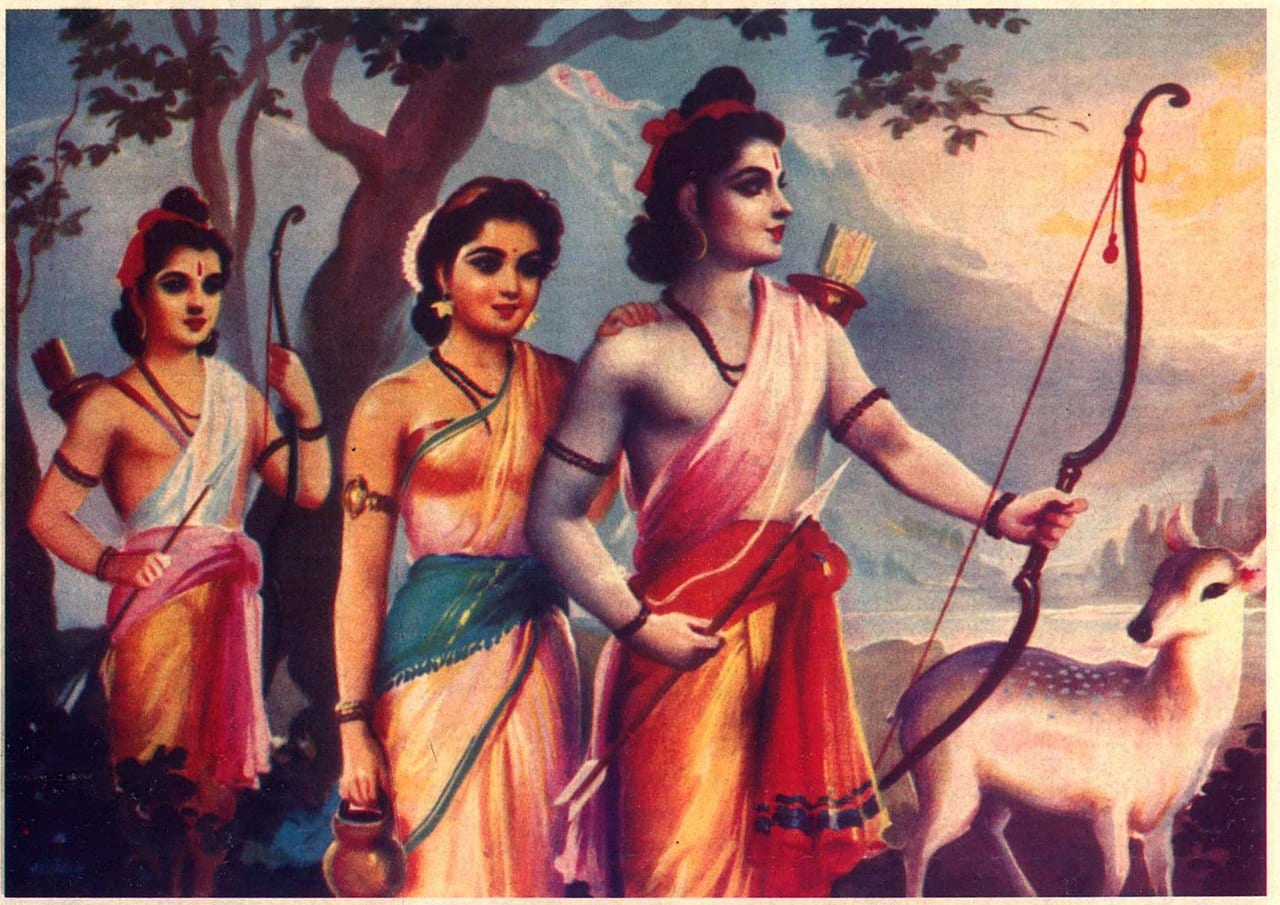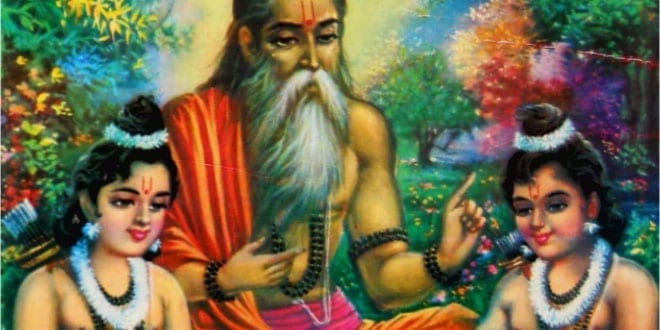
Long ago king Daśaratha, the sovereign of Ayodhyá, had a son, named Ráma, the elder brother of Bharata, Śatrughna and Lakshmaṇa. He was a partial incarnation of Vishṇu for the overthrow of Rávaṇa, and he had a wife named Sítá, the daughter of Janaka, the lady of his life.

As fate would have it, his father handed over the kingdom to Bharata, and sent Ráma to the forest with Sítá and Lakshmaṇa. There Rávaṇa carried off his beloved Sítá by magic, and took her to the city of Lanká, having slain Jaṭáyus on the way. Then Ráma, in his bereaved state, made Sugríva his friend by killing Bálin, and by sending Hanumán to Lanká, obtained news of his wife. And he crossed the sea by building a bridge over it, and slew Rávaṇa, and gave the sovereignty of Lanká to Vibhíshaṇa and recovered Sítá.
Then he returned from the forest, and while he was ruling his kingdom, that Bharata had made over to him, Sítá became pregnant in Ayodhyá. And while the king was roaming through the city at leisure, with a small retinue, to observe the actions of his subjects, he beheld a certain man turning his wife, whom he held by the hand, out of his house, and giving out that her fault was going to the house of another man.And king Ráma heard the wife saying to her husband,—“King Ráma did not desert his wife, though she dwelt in the house of the Rákshasa; this fellow is superior to him, for he abandons me for going to the house of a relation.”
So he went home afflicted; and afraid of the slander of the people, he abandoned Sítá in the forest; a man of reputation prefers the sorrow of separation to ill-repute. And Sítá, languid with pregnancy, happened to reach the hermitage of Válmíki, and that ṛishi comforted her, and made her take up her abode there. And the other hermits there debated among themselves; “Surely this Sítá is guilty, otherwise how could her husband have deserted her? So, by beholding her, everlasting pollution will attach to us; but Válmíki does not expel her from the hermitage out of pity, and he neutralizes by means of his asceticism the pollution produced by beholding her, so come, let us go to some other hermitage.”
When Válmíki perceived that, he said; “Bráhmans, you need not have any misgivings about the matter, I have perceived her by my meditation to be chaste. When even then they exhibited incredulity, Sítá said to them; “Reverend sirs, test my purity by any means that you know of, and if I turn out to be unchaste, let me be punished by having my head cut off.” When the hermits heard that, they experienced an emotion of pity, and they said to her, “There is a famous bathing-place in this forest, called Ṭíṭhibhasaras, for a certain chaste woman named Ṭíṭhibhí, being falsely accused by her husband, who suspected her of familiarity with another man, in her helplessness invoked the goddess Earth and the Lokapálas, and they produced it for her justification. There let the wife of Ráma clear herself for our satisfaction.”
When they said that, Sítá went with them to that lake. And the chaste woman said—“Mother Earth, if my mind was never fixed even in a dream on anyone besides my husband, may I reach the other side of the lake,”—and after saying this, she entered the lake, and the goddess Earth appeared, and, taking her in her lap, carried her to the other side. Then all the hermits adored that chaste woman, and enraged at Ráma’s having abandoned her, they desired to curse him. But Sítá, who was devoted to her husband, dissuaded them, saying,—“Do not entertain an inauspicious thought against my husband, I beg you to curse my wicked self.”
The hermits, pleased with that conduct of hers, gave her a blessing which enabled her to give birth to a son, and she, while dwelling there, in good time did give birth to a son, and the hermit Válmíki gave him the name of Lava. One day she took the child and went to bathe, and the hermit, seeing that it was not in the hut, thought—“She is in the habit, when she goes to bathe, of leaving her child behind her, so what has become of the child? Surely it has been carried off by a wild beast. I will create another, otherwise Sítá, on returning from bathing, will die of grief.” Under this impression, the hermit made a pure babe of kuśa grass, resembling Lava, and placed him there, and Sítá came, and seeing it, said to the hermit, “I have my own boy, so whence came this one, hermit?” When the hermit Válmíki heard this, he told her exactly what had taken place, and said, “Blameless one, receive this second son named Kuśa, because I by my power created him out of kuśa grass.” When he said this to her, Sítá brought up those two sons Kuśa and Lava, for whom Válmíki performed the sacraments. And those two young princes of the Kshatriya race, even when children, learned the use of all heavenly weapons, and all sciences from the hermit Válmíki.

And one day they killed a deer belonging to the hermitage, and ate its flesh, and made use of a linga, which Válmíki worshipped, as a plaything. The hermit was offended thereby, but at Sítá’s intercession he appointed for those youths the following expiatory penance: “Let this Lava go quickly and bring from the lake of Kuvera golden lotuses, and mandára flowers from his garden, then worship, both of you brothers, this linga with those flowers; in this way this crime of those two will be atoned for.” When Lava heard this, he went, though a boy, to Kailása, and invaded that lake and garden of Kuvera, and after killing the Yakshas, brought back the lotuses and the flowers, and as he was returning, being tired, he rested in the way under a tree. And in the meanwhile Lakshmaṇa came that way, seeking a man with auspicious marks for Ráma’s human sacrifice. He, according to the custom of Kshatriyas, challenged Lava to fight, and paralyzed him by the stupefying weapon, and taking him prisoner, led him to the city of Ayodhyá. And in the meanwhile Válmíki comforted Sítá, who was anxious about the return of Lava, and said to Kuśa in his hermitage, “Lakshmaṇa has taken prisoner the child Lava and has carried him off to Ayodhyá; go and deliver him from Lakshmaṇa, after conquering him with these weapons.”
When the sage said this, and gave to Kuśa a heavenly weapon, he went and with it attacked and besieged the sacrificial enclosure in Ayodhyá, and he conquered in fight Lakshmaṇa, who advanced to repel him, by the help of those heavenly weapons; then Ráma advanced to meet him; and when he could not, though exerting himself to the utmost, conquer with weapons that Kuśa, owing to the might of Válmíki, he asked him who he was, and why he came. Then Kuśa said, “Lakshmaṇa has taken my elder brother prisoner and brought him here; I have come here to set him at liberty. We two are Kuśa and Lava the sons of Ráma, this is what our mother, the daughter of Janaka, says.” Thereupon he told her story. Then Ráma burst into tears, and summoned Lava and embraced both, saying, “I am that same wicked Ráma.”
Then the citizens assembled and praised Sítá, beholding those two heroic youths, and Ráma recognised them as his sons. And then he summoned the queen Sítá from the hermitage of Válmíki, and dwelt with her in happiness, transferring to his sons the burden of the empire.

